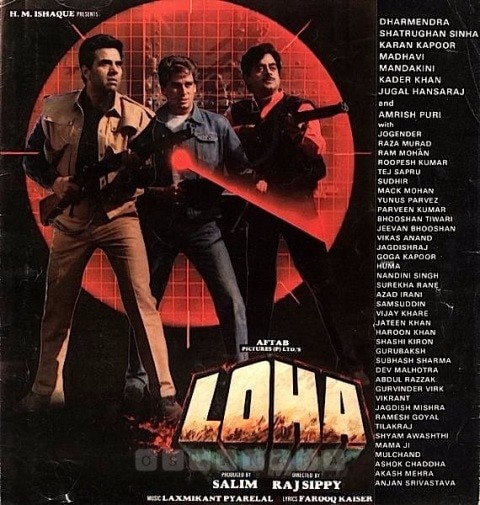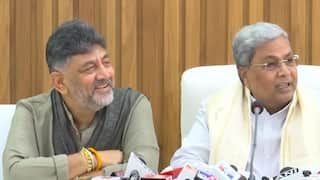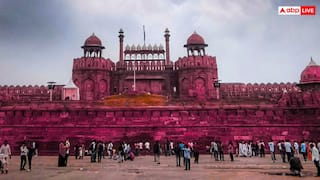Explorer
Loha

Photo Courtesy: Osianama
There was a phase in the 1980s when nothing was too improbable for commercial Hindi cinema. As far as it was concerned anything and everything would go and the years between 1985-87 were the zenith when it came to such. As unbelievable as it might have been many of films from this era are now enjoying a thematic revival of sorts and it would not be surprising if someone were to remake Loha (1987), a truly one of its kind vendetta film seen in Hindi cinema. On the face of it Loha is a no-holds-barred revenge film and offers very little to interpret but for film aficionados closer inspection reveals many things within the film’s narrative that are unique to popular Hindi cinema. Besides incorporating the various stimuli of a vendetta film, Loha gives almost every character a reason to avenge the transgressions of the main villain, which incidentally also inspired the title that means ‘revenge’ in Hindi, and merges everything with a thematic simulation of the seminal classic Wages of Fear (1953), where four men have to transport truckloads of a lethal chemical across a hellish landscape.
Loha had a basic plot where a disgraced police officer Amar (Dharmendra) is asked by his former partner, Dayal (Raza Murad), to help him get back his granddaughter Seema (Mandakini), who along with a bus load of people is kidnapped by a brigand Sher Singh (Amrish Puri). Amar had previously tried to nab Shera but the failed operation resulted in Dayal losing his limbs, something for which Amar holds himself responsible. Shera demands the release of twenty-five of his jailed associates in exchange for the passengers and while the official negotiations are on Amar puts together a small covert team. He along with Qasim (Shatrughan Sinha), an ex-convict with a heart of gold, Karan (Karan Kapoor), a drug peddler, and Anita (Madhvi), Seema’s elder sister, manage to free the passengers but once again Shera escapes. Joining forces with Jagannath Prasad (Kader Khan), a tainted local politician, Shera kidnaps Qasim’s son, Hassan (Jugal Hansraj), and forces him into freeing the jailed comrades. Qasim persuades Karan to help him free his motherless son and even the upright Amar ends up joining forces when he learns about Hassan. The three along with Anita and Seema free the convicts and now have to keep the pack of hardened criminals in their custody as they ferry them to Shera.
 Photo Courtesy: Osianama
Directed by Raj N. Sippy and written by Ravi Kapoor and Mohan Kaul with dialogues by Kader Khan, Loha is a top-notch B Film with excellent production qualities and a cast filled with familiar faces that make the film a fun trip. The film’s campiness and its commitment to being extreme across all elements truly adorn it a perverse sophistication. Like in Wages of Fear where the terrain to transport the unstable nitroglycerine is treacherous and the unpredictability of the interpersonal relationship between the four men adds to the tension, Loha also tries to induce the same tension but the straightforwardness with which it attempts it keeps things superficial. There is hardly any tension between Amar and Qasim once the former learns that it’s Hassan for whom they are merrily breaking the law and similarly the volatility of the nitroglycerin is replicated by the stereotypical antics of the bunch playing the convicts who ranged from Joginder of the runaway cult classic Ranga Khush (1975), Sudhir, Mac Mohan, Praveen Kumar, Goga Kapoor, Tej Sapru, Roopesh Kumar and Yunus Parvez to name a few. Barring Dharmendra, who had a great year in 1987 with 8 super hits in a row, both Sinha and Kapoor, too, appear to be checking stereotypical boxes. Even before his first film Sultanat (1986) released, Karan Kapoor had become a popular model and while his debut film’s script included a brief backstory of him being born to foreign mother, nothing in Loha explained his blonde mane, which looked strange when he is speaking decently comprehensible Hindi.
There is no real reason for Loha to enjoy a revival but the film involuntarily enough created a template that would soon go on to be replicated eerily enough in real life. Made a few years before the famous Rubaiya Mufti kidnapping by JKLF (Jammu Kashmir Liberation Front) where separatists demanded the release of five comrades for the daughter of Mufti Mohammad Sayeed, the then Home Minister of India, the film’s plot seemed extremely implausible. Many had even forgotten Loha by the time the Rubaiya Mufti kidnapping took place and while no one mentioned Loha at that point, the kidnapping found an indirect mention in Mani Rathman’s Roja (1992). If Loha were to be made today there’s hardly any doubt that it would be glitzy and chic and no one might think of it a B film. After all both Rubaiya kidnapping and the Air India Flight 814 hijacking in 1999 by Harkat-ul-Mujahideen and the subsequent release of three militants – Mushtaq Ahmed Zargar, Ahmed Omar Saeed Sheikh, and Maulana Masood Azhar – in exchange for over 150 passengers prove that truth, too, could replicate a potboiler.
Gautam Chintamani is a film historian and the author of the best-selling Dark Star: The Loneliness of Being Rajesh Khanna (2014) and The Film That Revived Hindi Cinema (2016) | Twitter @GChintamani
Photo Courtesy: Osianama
Directed by Raj N. Sippy and written by Ravi Kapoor and Mohan Kaul with dialogues by Kader Khan, Loha is a top-notch B Film with excellent production qualities and a cast filled with familiar faces that make the film a fun trip. The film’s campiness and its commitment to being extreme across all elements truly adorn it a perverse sophistication. Like in Wages of Fear where the terrain to transport the unstable nitroglycerine is treacherous and the unpredictability of the interpersonal relationship between the four men adds to the tension, Loha also tries to induce the same tension but the straightforwardness with which it attempts it keeps things superficial. There is hardly any tension between Amar and Qasim once the former learns that it’s Hassan for whom they are merrily breaking the law and similarly the volatility of the nitroglycerin is replicated by the stereotypical antics of the bunch playing the convicts who ranged from Joginder of the runaway cult classic Ranga Khush (1975), Sudhir, Mac Mohan, Praveen Kumar, Goga Kapoor, Tej Sapru, Roopesh Kumar and Yunus Parvez to name a few. Barring Dharmendra, who had a great year in 1987 with 8 super hits in a row, both Sinha and Kapoor, too, appear to be checking stereotypical boxes. Even before his first film Sultanat (1986) released, Karan Kapoor had become a popular model and while his debut film’s script included a brief backstory of him being born to foreign mother, nothing in Loha explained his blonde mane, which looked strange when he is speaking decently comprehensible Hindi.
There is no real reason for Loha to enjoy a revival but the film involuntarily enough created a template that would soon go on to be replicated eerily enough in real life. Made a few years before the famous Rubaiya Mufti kidnapping by JKLF (Jammu Kashmir Liberation Front) where separatists demanded the release of five comrades for the daughter of Mufti Mohammad Sayeed, the then Home Minister of India, the film’s plot seemed extremely implausible. Many had even forgotten Loha by the time the Rubaiya Mufti kidnapping took place and while no one mentioned Loha at that point, the kidnapping found an indirect mention in Mani Rathman’s Roja (1992). If Loha were to be made today there’s hardly any doubt that it would be glitzy and chic and no one might think of it a B film. After all both Rubaiya kidnapping and the Air India Flight 814 hijacking in 1999 by Harkat-ul-Mujahideen and the subsequent release of three militants – Mushtaq Ahmed Zargar, Ahmed Omar Saeed Sheikh, and Maulana Masood Azhar – in exchange for over 150 passengers prove that truth, too, could replicate a potboiler.
Gautam Chintamani is a film historian and the author of the best-selling Dark Star: The Loneliness of Being Rajesh Khanna (2014) and The Film That Revived Hindi Cinema (2016) | Twitter @GChintamani
 Photo Courtesy: Osianama
Directed by Raj N. Sippy and written by Ravi Kapoor and Mohan Kaul with dialogues by Kader Khan, Loha is a top-notch B Film with excellent production qualities and a cast filled with familiar faces that make the film a fun trip. The film’s campiness and its commitment to being extreme across all elements truly adorn it a perverse sophistication. Like in Wages of Fear where the terrain to transport the unstable nitroglycerine is treacherous and the unpredictability of the interpersonal relationship between the four men adds to the tension, Loha also tries to induce the same tension but the straightforwardness with which it attempts it keeps things superficial. There is hardly any tension between Amar and Qasim once the former learns that it’s Hassan for whom they are merrily breaking the law and similarly the volatility of the nitroglycerin is replicated by the stereotypical antics of the bunch playing the convicts who ranged from Joginder of the runaway cult classic Ranga Khush (1975), Sudhir, Mac Mohan, Praveen Kumar, Goga Kapoor, Tej Sapru, Roopesh Kumar and Yunus Parvez to name a few. Barring Dharmendra, who had a great year in 1987 with 8 super hits in a row, both Sinha and Kapoor, too, appear to be checking stereotypical boxes. Even before his first film Sultanat (1986) released, Karan Kapoor had become a popular model and while his debut film’s script included a brief backstory of him being born to foreign mother, nothing in Loha explained his blonde mane, which looked strange when he is speaking decently comprehensible Hindi.
There is no real reason for Loha to enjoy a revival but the film involuntarily enough created a template that would soon go on to be replicated eerily enough in real life. Made a few years before the famous Rubaiya Mufti kidnapping by JKLF (Jammu Kashmir Liberation Front) where separatists demanded the release of five comrades for the daughter of Mufti Mohammad Sayeed, the then Home Minister of India, the film’s plot seemed extremely implausible. Many had even forgotten Loha by the time the Rubaiya Mufti kidnapping took place and while no one mentioned Loha at that point, the kidnapping found an indirect mention in Mani Rathman’s Roja (1992). If Loha were to be made today there’s hardly any doubt that it would be glitzy and chic and no one might think of it a B film. After all both Rubaiya kidnapping and the Air India Flight 814 hijacking in 1999 by Harkat-ul-Mujahideen and the subsequent release of three militants – Mushtaq Ahmed Zargar, Ahmed Omar Saeed Sheikh, and Maulana Masood Azhar – in exchange for over 150 passengers prove that truth, too, could replicate a potboiler.
Gautam Chintamani is a film historian and the author of the best-selling Dark Star: The Loneliness of Being Rajesh Khanna (2014) and The Film That Revived Hindi Cinema (2016) | Twitter @GChintamani
Photo Courtesy: Osianama
Directed by Raj N. Sippy and written by Ravi Kapoor and Mohan Kaul with dialogues by Kader Khan, Loha is a top-notch B Film with excellent production qualities and a cast filled with familiar faces that make the film a fun trip. The film’s campiness and its commitment to being extreme across all elements truly adorn it a perverse sophistication. Like in Wages of Fear where the terrain to transport the unstable nitroglycerine is treacherous and the unpredictability of the interpersonal relationship between the four men adds to the tension, Loha also tries to induce the same tension but the straightforwardness with which it attempts it keeps things superficial. There is hardly any tension between Amar and Qasim once the former learns that it’s Hassan for whom they are merrily breaking the law and similarly the volatility of the nitroglycerin is replicated by the stereotypical antics of the bunch playing the convicts who ranged from Joginder of the runaway cult classic Ranga Khush (1975), Sudhir, Mac Mohan, Praveen Kumar, Goga Kapoor, Tej Sapru, Roopesh Kumar and Yunus Parvez to name a few. Barring Dharmendra, who had a great year in 1987 with 8 super hits in a row, both Sinha and Kapoor, too, appear to be checking stereotypical boxes. Even before his first film Sultanat (1986) released, Karan Kapoor had become a popular model and while his debut film’s script included a brief backstory of him being born to foreign mother, nothing in Loha explained his blonde mane, which looked strange when he is speaking decently comprehensible Hindi.
There is no real reason for Loha to enjoy a revival but the film involuntarily enough created a template that would soon go on to be replicated eerily enough in real life. Made a few years before the famous Rubaiya Mufti kidnapping by JKLF (Jammu Kashmir Liberation Front) where separatists demanded the release of five comrades for the daughter of Mufti Mohammad Sayeed, the then Home Minister of India, the film’s plot seemed extremely implausible. Many had even forgotten Loha by the time the Rubaiya Mufti kidnapping took place and while no one mentioned Loha at that point, the kidnapping found an indirect mention in Mani Rathman’s Roja (1992). If Loha were to be made today there’s hardly any doubt that it would be glitzy and chic and no one might think of it a B film. After all both Rubaiya kidnapping and the Air India Flight 814 hijacking in 1999 by Harkat-ul-Mujahideen and the subsequent release of three militants – Mushtaq Ahmed Zargar, Ahmed Omar Saeed Sheikh, and Maulana Masood Azhar – in exchange for over 150 passengers prove that truth, too, could replicate a potboiler.
Gautam Chintamani is a film historian and the author of the best-selling Dark Star: The Loneliness of Being Rajesh Khanna (2014) and The Film That Revived Hindi Cinema (2016) | Twitter @GChintamani
View More



























